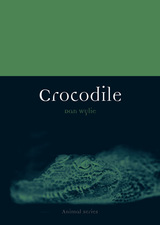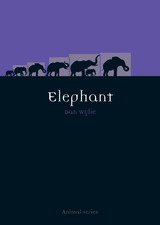3 books about Wylie, Dan

Crocodile
Dan Wylie
Reaktion Books, 2013
“Tick, tock, tick, tock.” Thanks to Peter Pan, this sound, if heard near water, means run: a hungry crocodile is on its way. J. M. Barrie isn’t fully to blame for spreading the word that crocodiles are our enemies, or at least the enemies of one-handed pirates—innumerable songs, stories, and legends have characterized these reptiles as a symbol of pitiless predation and insatiable appetite. Tracking twenty-three crocodilian species from India and Egypt to Africa, Australia, and beyond, Crocodile advocates that we do a complete one-eighty in our views of these magnificent creatures.
Dan Wylie traces the crocodile in myth, art, and literature, demonstrating that though we commonly associate the reptiles with ferocity and deceit, they have also often been respected and revered in human history. Discussing how crocodiles were all but wiped out in the middle of the twentieth century by hunters and skin traders and are now making a comeback, he reveals that, as apex predators, they are today an increasingly important indicator of the health of an ecosystem and may outlive humans like they did dinosaurs. Presenting a concise, cogent case for why we should respect these fearsome animals, this beautifully illustrated volume is a tribute to one of the world’s ultimate survivors.
[more]

Elephant
Dan Wylie
Reaktion Books, 2008
Aristotle characterized the elephant as “the beast which passeth all others in wit and mind” and the animal has long figured in cultural artifacts, even on continents it has never inhabited. Now Elephant provides an engaging look at the elephant’s long legacy.
The image of the elephant can be found throughout world cultures as a symbol of intelligence, strength, and loyalty. Wylie draws on a rich array of examples to document that symbolic power, ranging from symbols of the Hindu god of wisdom, Ganesh, to the beloved children’s works Dumbo and Babar the Elephant.
Turning to the elephant’s biological history, Wylie describes the three remaining species—the African Bush Elephant, African Forest Elephant, and the Asian Elephant—and the controversial efforts for elephant conservation. With ivory poaching and human encroachment into the animal’s natural habitats, Wylie argues that we face a uniquely poignant conservation crisis in which elephants and humans both unsustainably consume limited natural resources.
A compelling new entry in the Animal series, Elephant will be necessary for every animal lover’s bookshelf.
[more]

Myth of Iron
Shaka in History
Dan Wylie
Ohio University Press, 2008
Over the decades a great deal has been written about Shaka, the most famous—or infamous—of Zulu leaders. It may come as a surprise, therefore, that even the most basic facts about his life are locked in obscurity. His date of birth, what he looked like, and the circumstances of his assassination remain unknown.
Meanwhile the public image, sometimes monstrous, sometimes heroic, juggernauts on—truly a “myth of iron” that is so intriguing, so dramatic, so archetypal, and sometimes so politically useful that few have subjected it to proper scrutiny.
Myth of Iron: Shaka in History is the first book-length scholarly study of Shaka to be published. It lays out, as far as possible, all the available evidence—mainly hitherto underutilized Zulu oral testimonies, supported by other documentary sources—and decides, item by item, legend by legend, what exactly is known about Shaka’s reign. The picture that emerges in this meticulously researched and absorbing antibiography is very different from the popular narrative.
Meanwhile the public image, sometimes monstrous, sometimes heroic, juggernauts on—truly a “myth of iron” that is so intriguing, so dramatic, so archetypal, and sometimes so politically useful that few have subjected it to proper scrutiny.
Myth of Iron: Shaka in History is the first book-length scholarly study of Shaka to be published. It lays out, as far as possible, all the available evidence—mainly hitherto underutilized Zulu oral testimonies, supported by other documentary sources—and decides, item by item, legend by legend, what exactly is known about Shaka’s reign. The picture that emerges in this meticulously researched and absorbing antibiography is very different from the popular narrative.
[more]
READERS
Browse our collection.
PUBLISHERS
See BiblioVault's publisher services.
STUDENT SERVICES
Files for college accessibility offices.
UChicago Accessibility Resources
home | accessibility | search | about | contact us
BiblioVault ® 2001 - 2024
The University of Chicago Press









